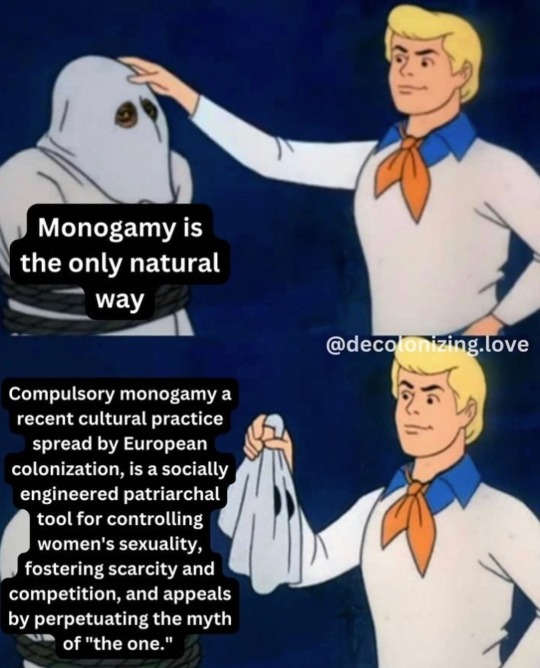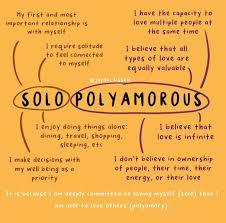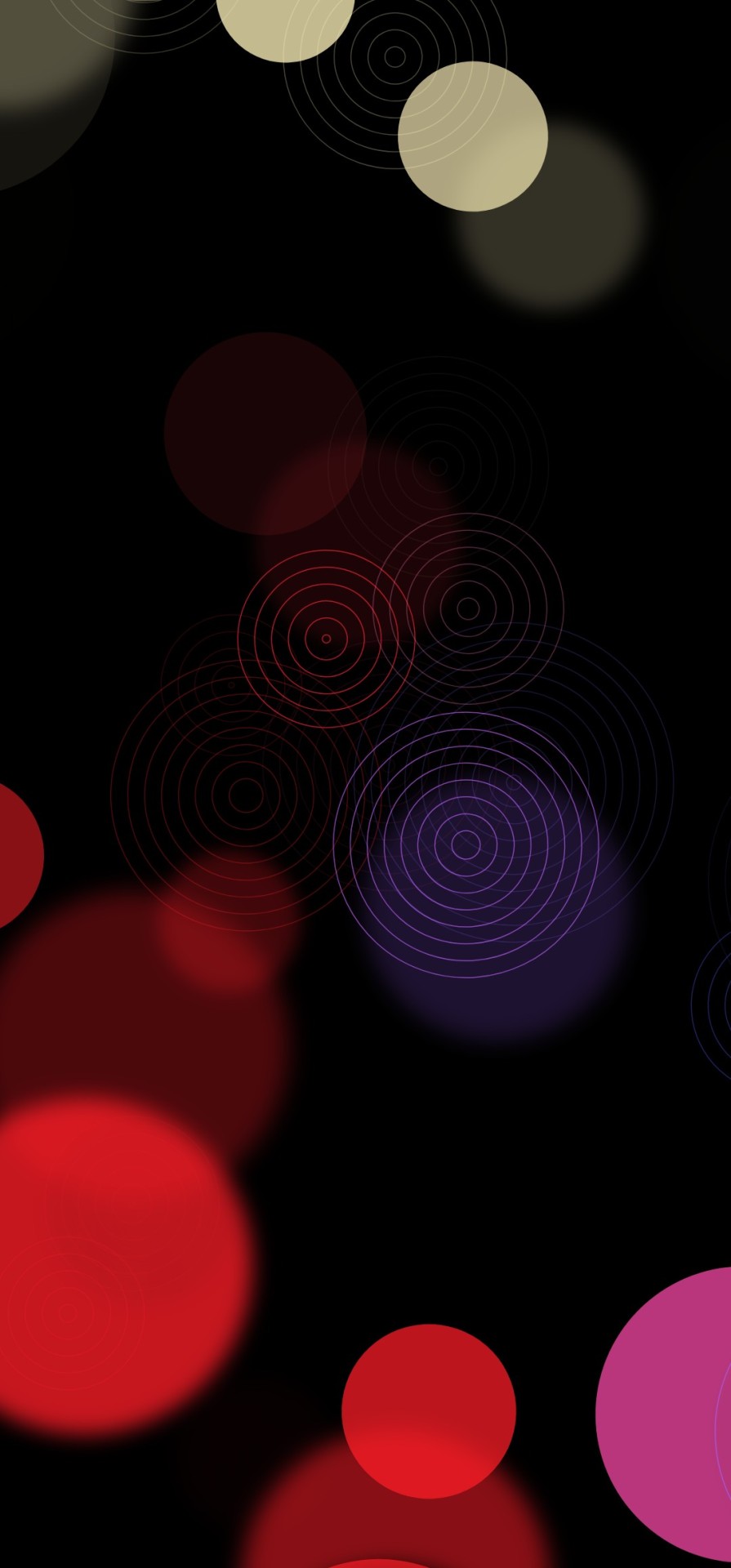#Solo Poly
Explore tagged Tumblr posts
Text

244 notes
·
View notes
Text
So through my university I've been able to get my hands on a lot of scholarly research around, nonmonogamies, polyamory, sexuality and all sorts of gender, race, class intersections on those topics.
Anybody interested in me posting them? Maybe even commenting on them as well?
#relationship anarchy#alternative relationships#relationship dynamics#kink mention#poly#polyamory#solo poly#nonmonogamy#ra
161 notes
·
View notes
Text
#meme#memes#miku binder thomas jefferson#solo poly#Hamilton#hamilton musical#thomas jefferson hamilton#funny#poll#fun polls
47 notes
·
View notes
Text
Reconnecting feels different this time around… lighter, deeper. We’ve seen each other’s light and dark, and somehow that makes the space between us feel safer, more real. There’s no need to explain who we are, we just accept it. And in that quiet understanding, we found a kind of peace that was missing.
There’s no pressure, just mutual respect, deep conversations, and clear communication.
#friends#writeblr#quotes#feelings#spilled words#love#literature#soulmates#platonic#soul connection#solo poly
12 notes
·
View notes
Text
What Is Solo Polyamory, The Strange New Relationship Trend On The Rise?
In the ever-evolving world of love, the popularity of solo polyamory is on the rise for various reasons
In the ever-evolving landscape of love, there's a relationship style that's capturing the curiosity of romantics and pragmatists alike: solo polyamory.
What is Solo Polyamory?
Solo polyamory is a relationship philosophy that combines the openness of polyamory with the independence of flying solo.
At its core, it's about practicing ethical non-monogamy without necessarily nesting, cohabiting, or merging life plans with a primary partner. Solo polyamorists value personal autonomy and prioritise their individuality while forming meaningful and consensual romantic or sexual connections with multiple partners.
Rather than fitting into the conventional relationship escalator (think dating, moving in together, getting married, and having kids), solo polyamory lets individuals define love on their own terms. It's not about rejecting commitment but about reimagining what commitment can look like for different people.
How Is Solo Polyamory Different From Other Relationships?
Here's how solo polyamory compares to other relationship styles:
Monogamy: The obvious difference is that monogamy involves a single partner at a time, while solo polyamory embraces multiple relationships.
Traditional Polyamory: In traditional polyamory, people might have multiple partners and could be part of a polycule (a network of interconnected partners). These relationships often include shared living arrangements or long-term commitments. Solo polyamory, by contrast, maintains a more individualistic approach the concept of cohabiting being absent in the equation.
Polygamy: Polygamy involves being married to multiple spouses simultaneously. It is often culturally or religiously rooted and can take different forms. Solo polyamory on the other hand, involves having multiple romantic or sexual relationships while maintaining personal autonomy.
Why Choose Solo Polyamory?
People are drawn to solo polyamory for various reasons.
For some, it's about finding a balance between connection and freedom.
For others, it's a way to explore love without adhering to societal pressures or timelines. It's also an empowering choice for those who want to prioritise their own goals, growth, and happiness minus the pressure or the labels of being in a traditional relationship and still enjoy fulfillment.
Is Solo Polyamory for You?
If the idea of combining meaningful connections with personal independence resonates with you, solo polyamory might be worth exploring. It's a relationship style that celebrates both love and individuality, proving that you don't have to choose one over the other.
Whether you're curious, intrigued, or ready to dive in, solo polyamory is a reminder that relationships can be as unique and dynamic as the people in them. After all, the best kind of love story is the one you write for yourself.
12 notes
·
View notes
Text
How I Love
freedom. connection. joy.
This is a personal reflection — a snapshot of how I see love and relationships, based on what I know so far and what I’m still learning. I don’t expect it to resonate with everyone. But it’s what feels true and right for me.
I’m exploring solo polyamory, which for me means valuing autonomy and not seeking to merge lives or identities with partners, even in deep or ongoing relationships. I’m also drawn to relationship anarchy, which questions the idea that love must follow predefined scripts — like couplehood, hierarchy, or exclusivity — and instead encourages intentional, self-defined ways of relating.
I’m not here to tell anyone how they should love or connect. What I am doing is naming how I love — or at least how I aspire to — especially because the ways I relate don’t follow conventional templates.
Love (to Me)
Love isn’t scarce. It’s not something I run out of by giving more of it to someone else. My love for my second kid didn’t decrease my love for my first kid. Love is not something I can only give to a few special people in a few specific ways. Love is a presence, a current, a practice. I can love someone and also love others. I can love someone and not want a particular kind of relationship with them. I can love someone and still choose myself.
The kind of love I value shows up as honesty, presence, kindness, shared joy and pleasure, mutual care, and respect for each other’s wholeness. It can look romantic, sexual, platonic, familial or some blending of all of that. It’s real because we say it is — not because of what we call it or how we structure it.
What I Value in Relationships
What I want from any intimate relationship is not permanence or exclusivity — it’s depth, honesty, playfulness, presence, and mutual acceptance. I want relationships where we care about each other not by holding on tightly, but by showing up thoughtfully. I want to be seen, appreciated, respected, and enjoyed — and I want to give the same in return. I want to laugh together. To cry together and hold each other. To take pleasure in the time we spend together, in whatever form it takes.
The relationships I build have different shapes. Some may be romantic, some sexual, some platonic, and many will blur those lines. What they all have in common is a commitment to honesty, mutuality, and conscious choice.
What I Don’t Accept
I don’t accept the idea that there’s one correct way to structure a relationship. I don’t believe in defaults. I don’t believe in unquestioned assumptions. I don’t believe that exclusivity, merging finances, living together, or being a “couple” are inherently signs of love or commitment. They can be — but only if consciously chosen.
For me, love has nothing to do with possession. I reject entitlement to someone’s body, time, or attention. I don’t accept the scarcity mindset that says love for one person subtracts from love for another. I reject hierarchies where some relationships are more real or valuable because of a label, a status, or a structure. I don’t accept the idea that loving someone means limiting what they can do with other people.
Commitment
Commitment, for me, means showing up in the ways we’ve said we will. It means honoring the agreements we make. That’s it. Not forever. Not exclusivity. Not entanglement. Commitment is contextual. It’s not about being committed to a person — it’s about committing to ways of relating. I used to think commitment had to mean permanence or sacrifice. Now I’m learning it can be something we write ourselves. If we’ve agreed to offer each other emotional support, to spend quality time together each week, or to celebrate important moments in each other’s lives, I’ll do all I can to make that happen. And if something needs to change — if we want to revise our agreements to better reflect what we want or need — we’ll talk about it and figure it out.
Change and Endings
Relationships change. Sometimes they deepen. Sometimes they shift. Sometimes they end. Ideally, I want to cultivate relationships that can evolve without resentment. I want honest, ongoing conversations that make space for change, even if it hurts. I want to care for each other well enough that we want what’s best for each other — even when that means letting go.
Every relationship ends one way or another. Staying until death isn’t inherently more meaningful than parting ways when life asks something different of us. I don’t see ending as failure. I see it as part of the natural life cycle of human connection.
Sex
I really like sex. Casual sex, deeply connected sex — all of it can be meaningful in different ways. Sex can help build connection for me. But it isn’t a necessity. I can imagine having an intimate romantic relationship that isn’t sexual — for example, with an asexual partner — and I have had deeply connected platonic relationships that include sex.
Sex is a form of play, of intimacy, of mutual enjoyment and care. Not a requirement, not a currency, not a marker of hierarchy. But sexual compatibility does matter to me if sex is going to be part of the relationship. Mismatches in desire or style can be challenging. But again, that’s something to talk about, not something to fear.
Autonomy and Care
Autonomy matters deeply to me. I don’t want to lose myself in a relationship, and I don’t want anyone else to lose themselves either. At the same time, I care — a lot. And I know that sometimes care can drift toward caretaking or codependence. I’m learning to ask: what’s mine to do? And what’s theirs? I’m learning to embrace the discomfort that is often an inextricable part of respecting each other’s autonomy.
I believe I can be deeply connected to someone and still be fully myself. I want that for both of us.
Jealousy
Jealousy isn’t a sin or a failure. It’s a signal. To me, jealousy is usually fear — fear of losing someone, or of being left out or left behind. But instead of facing our own fear, we blame others. That’s where the trouble starts. No one else is to blame. We create our own fears from the stories we tell about ourselves, our partners, and our relationships.
I try to meet jealousy with curiosity and care. What do I really need? Maybe reassurance. Maybe time together. Maybe just space to feel what I feel. What I don’t need is to control my partner. If I’m afraid, I want to be comforted by what my relationship with my partner includes, not by what my partner’s other relationships exclude. I want to live in a world where we treat jealousy as a teacher, not a reason to restrict someone’s freedom.
I think we need to examine the cultural narratives that have conditioned us to see love through a lens of scarcity — stories that often serve systems like capitalism and patriarchy, systems we didn’t choose and don’t benefit from. Love isn’t a pie. We’ve just been told it is.
Loving Me
If you want to love me well, know this:
I value honesty over niceness. Just say it. I can handle it. We’ll talk it out.
I look strong. And I am strong. But that doesn’t mean I’m invulnerable. As Ted Lasso told us, “Be curious, not judgmental.”
If you hurt me, I’ll talk to you about it and how to do better next time. We all mess up every now and then. But I won’t stay where I’m not safe.
If we’re not right for each other, that’s alright. I won’t stay just to stay — and I don’t want you to either. I’ll leave if I need to, and I hope you will too. We’ll both be okay.
I don’t believe in forever. Now is all we can know. Everything ends eventually. I believe in love that’s real, even if it’s temporary.
I’m wary of entanglements that are hard to unwind. Things like marriage, shared property, or even living together. Not because they’re bad, but because they can trap us in relationships that no longer serve us.
I won’t let a relationship hold me back from the life I want. I don’t want you to either.
Life has been both brutal and beautiful. I want to live it fully now. I want to love and be loved, openly and abundantly.
Why I’m Doing This
I’m finding my way — not by following a map, but by staying close to what feels honest, intentional, and real. I’m working in and around the frameworks of solo polyamory and relationship anarchy, but mostly, I’m just trying to show up in ways that make me feel grounded in who I am.
This reflection is how I make sense of what I want and what I offer, and I’m sure I’ll be revising it from time to time, the more I learn about myself and how I love. Writing it out helps me be clear with myself — and with anyone who might want to love me, spend time with me, or build something alongside me. My relationships may be unconventional, but they are full of meaning. I care deeply, and I want the people I love to feel seen, held, and free — because I don’t know anything more loving than that.
5 notes
·
View notes
Text
Steady
After my doctor’s appointment–I am so glad that my son met me there after taking the bus–I made dinner for him, and made my girlfriend some Thai-inspired coriander chicken with broccoli. I went over there to talk. She had wanted us to watch a movie, and I thought that wouldn’t have been a good use of our precious time. I find her the easiest person to be around because she’s mellow and…

View On WordPress
4 notes
·
View notes
Text
I swear my next therapy session is going to be incredibly interesting because I’ve come to a profound realization that I have an abundance of love to give to several people I want to be in my life forever. From my current poly partner to potential partners, I’ve come to believe that polyamory is the perfect fit for me. There’s just so much I want to offer and give to people I consider worthy of my love and care. They deserve so much goodness, and I want to be a part of the reason they receive so much love and support. I know there’s a lot of internal development I need to do that’s finally healing since my ex-wife really scarred a part of my soul. I think I’m finally fully healing the unseen wounds that I never knew existed.
2 notes
·
View notes
Text
I took a conscious decision to move away from traditional norms and embrace a new path. This last week I have really started to see the difference from all the hard work.
This weekend I have felt so many amazing emotions and I'm so blessed.
Saturday, an awesome person held my hand reassuringly while their partner and I kissed.
Sunday, my long distance girly wanted to see me, she doesn't drive far so her husband bought her to see me.
I'm so lucky to have such special people in my life.
#helpfully unhelpful#polyamorous#polylife#solo poly#relationshipgoals#relationship anarchy#compersion#emotions
10 notes
·
View notes
Text

Solo polyamory is a form of polyamory where individuals engage in multiple romantic or sexual relationships but do not prioritize a primary partner. Instead, they choose to maintain their independence and autonomy while forming connections with others. In solo polyamory, relationships can be varied and may include various levels of intimacy and commitment, but the focus is often on personal freedom rather than traditional relationship structures that emphasize exclusive partnerships or hierarchy among partners. This approach allows individuals to explore connections without the constraints often associated with conventional monogamous or hierarchical polyamorous relationships.
9 notes
·
View notes
Text
Compersion, Jealousy, and Polyamory/Consensual Non-Monogamy Research Dump.
(I'm also thinking of making a discord, telegram, or whatsapp group to like read these and other articles and discuss and develop our own ideas in relation to all this info. Please dm, comment or add something in the reblogs to let me know if that's worth the time.)
Love and Freedom: Transcending Monogamy and Polyamory FERRER, JORGE N. (2022). Love and Freedom: Transcending Monogamy and Polyamory. London, UK: Rowman & Littlefield. ix þ 212 pp. ISBN: 978-1538156575 From Romantic Jealousy to Sympathetic Joy: Monogamy, Polyamory, and Beyond Ferrer, Jorge N. "Monogamy, polyamory, and beyond: spirituality and intimate relationships." Tikkun, vol. 22, no. 1, Jan.-Feb. 2007, pp. 37+. Gale Academic OneFile
Polyamorous Individuals’ Jealous and Compersive Responses to Their Partner’s New Relationship Energy: The Role of Mindfulness, Emotion Regulation, Distress Tolerance, and Empathy Clemons-Castaños, C. R. (2024). Polyamorous individuals’ jealous and compersive responses to their Partner’s new relationship energy: The role of mindfulness, emotion regulation, distress tolerance, and empathy (Order No. 31293851).
Your Happiness Is My Happiness: Predicting Positive Feelings for a Partner’s Consensual Extra‑Dyadic Intimate Relations Flicker, S.M., Sancier-Barbosa, F. Your Happiness Is My Happiness: Predicting Positive Feelings for a Partner’s Consensual Extra-Dyadic Intimate Relations. Arch Sex Behav 53, 941–958 (2024)
Classifying Our Metamour/Partner Emotional Response Scale (COMPERSe)
Polyagony: An Exploration of Jealousy Deri, Jillian. Love's Refraction: Jealousy and Compersion in Queer Women's Polyamorous Relationships, Toronto: University of Toronto Press, 2015
If You Move to the Rainforest, You’ve Got No Right to Complain about the Rain: From Polyagony to Compersion Deri, Jillian. Love's Refraction: Jealousy and Compersion in Queer Women's Polyamorous Relationships, Toronto: University of Toronto Press, 2015
Triangular Trouble: A Phenomenological Exploration of Jealousy’s Archetypal Nature in Polyamorous Individuals Hamilton, Jolene Emily. "Triangular Trouble: A Phenomenological Exploration of Jealousy’s Archetypal Nature in Polyamorous Individuals." Order No. 27743962 Pacifica Graduate Institute, 2020. United States -- California: ProQuest.
Transforming Jealousy and Envy Into Compersion A Therapist’s Guide to Consensual Nonmonogamy Orion, R. (2018). A Therapist’s Guide to Consensual Nonmonogamy: Polyamory, Swinging, and Open Marriage (1st ed.). Routledge.
Working with Clients Who Are Non-monogamous And Those Who Want to Be Nichols, M. (2020). The Modern Clinician's Guide to Working with LGBTQ+ Clients: The Inclusive Psychotherapist (1st ed.). Routledge
Attempts to Sublimate: Compersion Fosse, M.J. (2021). The Many Faces of Polyamory: Longing and Belonging in Concurrent Relationships (1st ed.). Routledge
Factors that Facilitate and Hinder the Experience of Compersion Among Individuals in Consensually Non‑Monogamous Relationships Flicker, S.M., Thouin-Savard, M.I. & Vaughan, M.D. Factors that Facilitate and Hinder the Experience of Compersion Among Individuals in Consensually Non-Monogamous Relationships. Arch Sex Behav 51, 3035–3048 (2022). https://doi.org/10.1007/s10508-022-02333-4
Feeling Good About Your Partners’ Relationships: Compersion in Consensually Non-Monogamous Relationships Flicker, S.M., Vaughan, M.D. & Meyers, L.S. Feeling Good About Your Partners’ Relationships: Compersion in Consensually Non-Monogamous Relationships. Arch Sex Behav 50, 1569–1585 (2021). https://doi.org/10.1007/s10508-021-01985-y
#relationship anarchy#poly#alternative relationships#solo poly#polyamory#relationship dynamics#nonmonogamy#ra#polyam#polyamourous#polyam pride#polycule
121 notes
·
View notes
Text
Just came across the concept of solo poly, and it really resonates with where I’m at in life. I’m prioritizing myself - nothing less. The idea of forming meaningful connections without compromising who I am or centering my life around someone else feels refreshing and rooted in self-trust, not codependency. It’s freeing - a way to unlearn old beliefs and patterns.
As someone who deeply values connection, I love how different people can bring out different parts of you - emotional, intellectual, physical - and how each bond can be valid in its own way. I don’t have it all figured out, but the idea of loving without losing myself? That’s definitely something I’m sitting with. My goals for the future haven’t changed - just my approach.
#writeblr#quotes#feelings#spilled words#relationship#love#dark academia#soulmates#literature#solo poly#free spirit#friendship#solitude#solo#self love
15 notes
·
View notes
Text
me when meaningless sex: :D
me when meaningFUL sex with someone else: :D
me when my meaningless sex partner has meaningFUL sex with someone else: by talos this can’t be happening
#like damn#meaningless sex really do be not meaning anything#like#not even that they like you lmfao#or that they think you’re hot#shit is meaning LESS it has no meaning#poly#polyamory#solo poly#sex positive
5 notes
·
View notes
Text
Solo polyamorous/solo poly wallpapers/backgrounds






























Definition and flag can be found on this wiki post:
#solo poly#solo polyamory#backgrounds#wallpapers#blue#pride#tapet#black#red#tan#beige#geometric patterns#polyamory#polyamorous#polyam#solo polyamorous#hearts
6 notes
·
View notes
Text
I just found out about Kitchen Table Polyamory, and I instantly started to weep.
Oh my goodness...
#ktp#kitchen table polyamory#art#artist#various evidence#love#evidence#polyamory#solo poly#still finding myself
7 notes
·
View notes
Photo


(via Groups)
2 notes
·
View notes